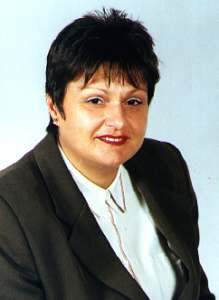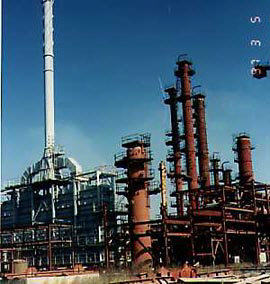
|

Read our exclusive interview. |

 POLIMERI PLC – DEVNYA POLIMERI PLC – DEVNYA
Manager:
Anna GLAVINOVA - Executive Director and Chairperson of the Administrative Board
Contact:
POLIMERI PLC – DEVNYA
9160 DEVNYA
BULGARIA
Mss Anna GLAVINOVA:
Phone: + 359 2 963 20 80 // 359 52 600 425
Fax: 359 2 963 20 68 // 359 519 / 32 68
Mr Nikolay BANEV, Chairman of the Supervisory Board
hone: 359 2 6399 4933, fax: 359 2 693 20
68
e-mail: polimeri@cubox.digsys.bg
|

 COMPANY PROFILE COMPANY PROFILE |
POLIMERI Plc. - Devnya is the only producer of polyvinylchloride emulsion (PVC – E), ethylene dichloride, caustic soda, hydrochloric acid, liquid chlorine and ferric chloride in Bulgaria. It also produces plastisols, hypochlorite, technical caustic chlorine, PVC – granulate and PVC – pipes.
In 1997 80% of the sales of the company are for export, the bigger part of which is traded by naval transport with its own terminals for ethylene dichloride and caustic soda at the Port of Varna.
POLIMERI Plc. also exports hydrochloric acid, plastisols, polyvinylchloride emulsion and liquid chlorine.
The products of the company are sold in more than twenty countries in the world.
 Activities Activities |
 POLIMERI ACTIVITIES POLIMERI ACTIVITIES
DIAPHRAGM CAUSTIC SODA, TECHNICAL GRADEPURIFIED CAUSTIC SODAETHYLENE DICHLORIDE ( EDC)EMULSION POLIVINYLCHLORIDE (PVC – E)POLYVINYLCHLORIDE – SUSPENTSION (PVC – S)HYDROCHLORIC ACID, SYNTHETIC, TECHNICAL GRADEHYDROCHLORIC ACID – CHEMICALLY PURELIQUID CHLORINEDEVIPLAST MK-3/105 PLASTISOL FOR SEALINGDEVIPLAST 331 PLASTISOL FOR SEALINGDEVIPLAST T96/105 PLASTISOL FOR SEALINGDEVIPLAST MK-B PLASTISOL FOR SEALINGDEVIPLAST MK-TP PLASTISOL FOR SEALINGDEVIPLAST FCHLORINATED LIMESODIUM CHLORIDE – TECHNICALLY PURESALT FOR STOCK-BREEDING (FODDER GRADE)FERRIC CHLORIDE, LIQUID, TECHNICAL GRADEHYPOCHLORITEBLEACHERTRIZON – A PREPARATION FOR DISINFECTION AND WASHINGP.V.C. PIPESP.V.C. GRANULATE
Top of page
 STRATEGY STRATEGY |
 Interview with Anna Glavinova Interview with Anna Glavinova
Executive Director and Chairperson of the Administrative Board of POLIMERI
Q : We know that POLIMERI is the best and most solid company in your sector in Bulgaria. Could you give us a brief historical background of POLIMERI?
A : POLIMERI was founded in 1962 when the first plant for chlorine and polyvinylchloride (PVC) was set up. Its installations produce liquid chlorine, caustic soda, hydrochloric acid, chlorinated lime, carbide, vinylchloride(VCM) and polyvinylchloride emulsion (PVC-E).
Another plant for chlorine and PVC started operating in 1979. Its main installations for nitrogen, oxygen, chlorine, caustic soda, vinylchloride and PVC have a much greater capacity than the old one and a higher technological quality. An installation for purification of diafragm caustic soda was released licensed by PPG-USA and designed by KESTNER-France in 1983.
In 1989 we imported mainly Japanese and US equipment designed by Goodrich - USA,
« Chisso Engineering », Mitsui Tuatso and Toyo Engineering – Japan. Since
1989 the whole equipment accounting to 133 mln USD was moved to Devnia.
In October 1991 this new plant was closed because of insufficient funds. Its capacity will be 150 000 tons vinylchloride and 120 000 tons polyvinylchloride suspension (PVC-S), half of which is for export.
The first stage in building the new chlororganic complex in 1988 an ethylene dichloride installation was build and released within extremely short terms as compared with the world practice. It was designed by Toyo Engineering – Japan licensed by Mitsui Tuatso with a capacity of 120 000 tons a year on refuse-less technology. 99% of the production is due for export.
The new chlor-alkali electrolysis licensed by HUCKER and designed by UHDE – Germany was released in 1991. It has the capacity of 140 000 tons a year of caustic soda and 124 000 tons a year of chlorine.
The construction of two new evaporating batteries for the production of caustic soda was started in 1995 designed and equipped in Russia. The first production line was released in 1997.

The capacity of POLIMERI Plc. for ethylene dichloride is 120 000 metric tons a year, for caustic soda – 120 000 metric tons a year, for hydrochloric acid – 60 000 metric tons a year, for plastisols – 5 000 metric tons a year, for technical salt – 10 000 metric tons a year, for ferric chloride – 3 000 metric tons a year. | The company has 8 patents (for invention, trade mark and know-how). Our trade mark is protected by the Patent Department for Proper Payment in the Patent Law.
In the spring of 1996 the company was announced for privatisation and for the period by May 1998 a majority owner became AKB – Corporation Plc. with more than 62% shares. Right now the company has some more than 90% of private capital. At the same time it is a monopolist in its field.
A very important fact is the company’s strategic geographical situation and the good outer infrastructure. It is built close to the Port of Varna – West, the ferry-boat port and a big salt bed is at a distance of 20 km in the town of Provadia, as well as to water and electric power stations. POLIMERI also has its own electric power station, a part of the national electric power system.
Q : We know that your company made a profit of 10 million DEM last year. Could you tell us your latest financial results, your turn over?
A : The financial results for the last financial year are extremely good – the company is at a profit of 10 million DEM and a turnover of 84 billion Bulgarian levs.
Q : Could you tell us what are the main guidelines of your strategy for the best opportunities of the future growth of your company?
A: There are two most important priorities in the policy of the company . The first is two new installations for vinylchloride and for polyvinylchloride the equipment for which was bought back in 1989 and which will enlarge the production structure and will enable a stable presence and flexibility wanted by the modern market. The two installations are planned by Japanese companies and their capacity is about 150 000 tons of chlorine and 120
000 tons of polyvinylchloride, 50% of which is due for export. 75% of the installations were ready yet in 1991 but then the work was stopped because of lack of funding. The new majority owner AKB Corporation Plc. is looking now for a new financial partner for the finishing off of the new installations. We shall need about 35-40 million USD for this and for the compulsory technical tests. This will take a period of 18 months. It is the first and foremost line in the future development of the company and a priority for the new owner.
Another priority is that POLIMERI should be turned into a modern trade company because it has a highly qualified staff a part of which was specially trained in Japan and capable of putting to exploitation the new installations and production lines.
Q : How did the new ownership of AKB affect POLIMERI?
A : The new majority owner AKB Corporation Plc. has formed a managing team of its own, which has been running the company successfully for two months now. All the employees in the plant have been actively participating in the reforms launched by the new owner. A major reconstruction and modernisation of the main production lines is under way at the moment. The plant enjoys a rhythmical regime of production.
Q : Being a chemical plant, POLIMERI has to face the ecological issue as well. Could you tell us what is your company doing to tackle this issue?
A : It is true that the plant had some problems regarding environment protection before 1991 and that is why several production lines were closed, e.g. mercury electrolysis and carbide. After that the ecological situation in the region was considerably improved : there was no more air pollution, chlorine contents in the atmosphere went down, and the water and the soil were cleaned. In addition to the closing down of the above mentioned productions the company budgets the main production sectors.
Q : Could you tell us something about your contacts with American companies as well as with other countries?
A : POLIMERI Plc. has established trade relations mainly with European countries and with the help of tankers it exports ethylene dichloride for Turkey, Israel, Croatia, the USA, Italy ; caustic soda for Turkey, Italy, Yugoslavia, Greece and Albania; hydrochloric acid for Romania and Turkey. The export for these countries is facilitated by our closeness to the Port of Varna – West. Unfortunately POLIMERI Plc. is not yet well known to the American market because almost all of our production is exported to Europe and besides, we have not signed any long-term contracts with the USA. Recently, however, we signed a contract for a spot sale for 5 000 metric tons of ethylene dichloride for the USA.
Q : As we say in the USA, contacts often mean contracts. What are you doing to encourage greater contacts?
A : We have an enormous interest in our relations with the potential partners in the USA. Three months ago the Chairman of the Supervisory Board of POLIMERI Plc. Mr. Nikolai Banev was on a business visit to the USA in order to find new partners for our company.
Q : You were saying about your strategic geographic position. What other advantages would you mention that could be attractive to foreign investors?
A : As an advantage of our company I can mention the strategic geographic position of the plant, the good inside and outside infrastructure, the qualified staff and the good quality of the chemical products that we produce, i.e. their purity, as well as their wide application in many kinds of industries, such as the chemical, textile, pharmaceutical, soap production, cellulose, polish production, leather production, foods, metal production, etc.
Q : How confident are you of the future of your company and the country as a whole?
A : Generally I am an optimist in spite of the crisis in the Far East which had a negative impact on our company but such crises often happen in the chemical industry. The contacts that we have been making within the last month with international partners are giving me confidence and hope for all the efforts we are undergoing and the aims we target at.
Q : As a final issue, what would be your final message to our readers?
A : I would like to wish the readers of the FORBES magazine a strategic management and a successful control of their investments in their business, as well as a lot of health and luck. |
© World INvestment NEws, 1998.
This is the electronic edition of the special country report on Bulgaria
published in FORBES Magazine's
November 30th issue.
Developed by AgenciaE.Tv
| |
|
| |
| | | |
|
|

